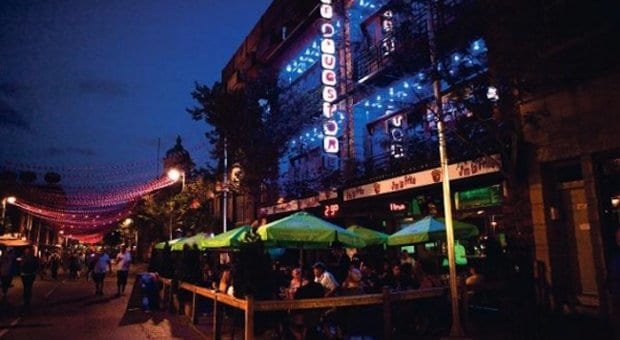Over the last two years, business owners, their patrons and residents in Montreal’s famed gay village have endured a crime wave widely blamed on the east-end neighbourhood’s homeless drug addicts. But nothing prepared them for the recent closures of Priape and Le Drugstore — two of the largest and best-known businesses in the Village. And both within a week of each other.
Priape was founded in Montreal in 1974 by former owner Bernard Rousseau. It eventually expanded to Toronto, Calgary and Vancouver, but on Oct 21, Xtra reported, the chain closed shop under a crushing debt load.
A week earlier, Le Drugstore — Montreal’s huge LGBT nightlife complex — shut down after its owner stated she could no longer afford to keep it open.
“As of Oct 14, 2013, our rent was $34,000 per month (including municipal taxes) and on this day of mourning all was in play until the very last second,” Nancy Giannoukakis-Poissant wrote in an Oct 15 French-language post on Le Drugstore’s Facebook page, a post now removed. “After days, weeks, months and years of negotiations, here we are on the street, having never recovered our investment and not finding any takers.”
Giannoukakis-Poissant declined Xtra’s request for further comment, replying via Facebook message, “I’m sorry, I cannot comment for the moment. My testimony [on Facebook] has created a lot of waves.”
For his part, in an interview with Radio-Canada, building owner Nicolas Tétrault blamed Le Drugstore’s closure on high municipal taxes. “Our problem, and the problem of other downtown merchants, is that municipal taxes are very expensive,” Tétrault says. “We are talking about $66,000 just for my building per year, which is inconceivable.”
A representative from Montreal’s Village merchants association, La Société de Développement Commercial (SDC) du Village, was not available for comment at time of publication.
It’s a sad end to Le Drugstore, which was opened by disgraced former Montreal cop Normand Chamberland, who resigned from the vice squad in 1984 after he was nailed for running one of Quebec’s biggest illegal gambling operations.
“It was during an investigation of mafia kingpin Nicodemo Cotroni that Montreal police discovered their colleague’s moonlighting,” investigative reporter Alex Roslin wrote in a 2003 profile of Chamberland for Saturday Night magazine. “Investigators followed him and tapped his phones for six months before arresting him . . . As part of the same bust, police executed 83 search warrants around the city, arrested 65 people and seized 184 of his machines, worth $1 million — enough to fill the police warehouse. It was the top story in the Journal de Montréal daily tabloid. Chamberland turned in his badge, pleaded guilty to 63 illegal gaming charges and agreed to pay everyone’s fines —a total of $35,000. He served no jail time.”
Chamberland then bought La Taverne du Village (where Le Drugstore stands today). La Taverne is — with former Priape owner Bernard Rousseau’s now-defunct gay-porn Cinema du Village — credited with giving Montreal’s Village its name.
Ignoring city regulations, Chamberland then turned his tavern into a massive three-storey complex that boasted several bars on six levels with four outdoor terraces. He renamed the complex Le Drugstore and his ostentatious building ushered in the era of the huge gay complex in Montreal’s Village.
Chamberland also demolished a city block of rundown houses to build his Bourbon Complex, a New Orleans–style gay Disneyland of restaurants, bars and outdoor terraces, a 35-room hotel, the legendary disco La Track, a sauna, ice cream parlour and a wedding chapel. The Bourbon became arguably the Village’s best-known tourist attraction, and Chamberland boasted it was the “biggest gay entertainment complex in the world.”
But Chamberland had bigger plans. “I remember when Normand wanted to close down the street during Divers/Cité and have it become an outdoor casino,” Divers/Cité co-founder and head honcho Suzanne Girard told this reporter back in 2011. “He told me, ‘Why don’t we do this?’ And we [at Divers/Cité] were gay pride activists then. It could have been wild, now that I think of it!”
In 2005, Chamberland surrendered both The Bourbon Complex and Le Drugstore to creditors, then died of heart-related health problems in 2008 at the age of 61. At its height, Le Drugstore — which became the city’s primary bar for the lesbian community — had more than 150 employees and Chamberland was hailed a “visionary” in his Fugues magazine obituary.
In her Facebook post, Giannoukakis-Poissant says she took over Le Drugstore in April 2009. But by the time the establishment closed on Oct 14, the face of Montreal’s Village had changed radically: the two festivals that originally put Montreal on the international gay map — Divers/Cité and Black & Blue — were both in decline, and many Village establishments had closed their doors, including Gotha Lounge, Parking Nightclub, Java U and Sky Club (the third floor of the Sky complex).
“You have a lot of cities like Kansas City that are well known but they don’t have what we have,” Chamberland once told this reporter. “You have to ask, ‘What is it that tourists come here for?’ They come to Montreal to let the good times roll.”
If Chamberland were still alive today, though, he’d be hard-pressed to recognize the Village he did so much to build.


 Why you can trust Xtra
Why you can trust Xtra


